 Petzlover
Petzlover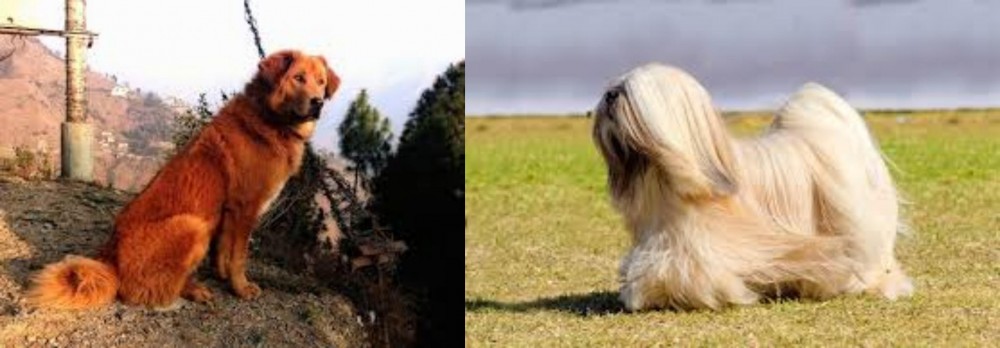 Himalayan Sheepdog is originated from India but Lhasa Apso is originated from China. Himalayan Sheepdog may grow 43 cm / 17 inches higher than Lhasa Apso. Himalayan Sheepdog may weigh 37 kg / 82 pounds more than Lhasa Apso. Both Himalayan Sheepdog and Lhasa Apso has same life span. Himalayan Sheepdog may have more litter size than Lhasa Apso. Himalayan Sheepdog requires High Maintenance. But Lhasa Apso requires Moderate Maintenance
Himalayan Sheepdog is originated from India but Lhasa Apso is originated from China. Himalayan Sheepdog may grow 43 cm / 17 inches higher than Lhasa Apso. Himalayan Sheepdog may weigh 37 kg / 82 pounds more than Lhasa Apso. Both Himalayan Sheepdog and Lhasa Apso has same life span. Himalayan Sheepdog may have more litter size than Lhasa Apso. Himalayan Sheepdog requires High Maintenance. But Lhasa Apso requires Moderate Maintenance
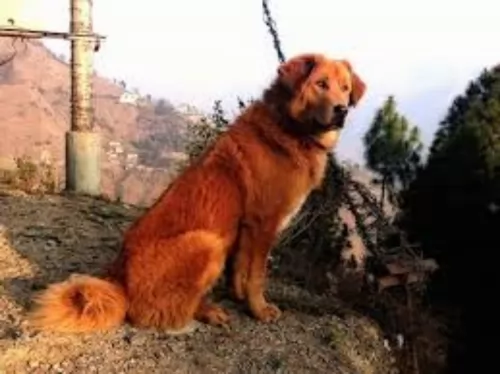 The Himalayan Sheepdog comes from Nepal originally and was bred as a guardian for livestock. The exact location where the breed comes from is not documented well but it is thought that they come from North India and Nepal and they are rare outside of that area. They are a mountain dog – close in ancestry to the Himalayan Mastiff, and the Kinnaur Sheepdog of Tibet (Himalaya). All these Himalayan mountain dogs were all called “Gaddi dogs”. The term was used for all the large dogs no matter what their breeds actually were.
The Himalayan Sheepdog comes from Nepal originally and was bred as a guardian for livestock. The exact location where the breed comes from is not documented well but it is thought that they come from North India and Nepal and they are rare outside of that area. They are a mountain dog – close in ancestry to the Himalayan Mastiff, and the Kinnaur Sheepdog of Tibet (Himalaya). All these Himalayan mountain dogs were all called “Gaddi dogs”. The term was used for all the large dogs no matter what their breeds actually were.
The Himalayan Sheepdog is called by various names depending on where they were from. They are called Gaddi Leopardhund in Himachai Pradesh, In Nepal they are known as Bhote Kukkur or Bhotiya. Then there are Chamba Gaddi dogs. They are an ancient breed that existed before documentation on breeds was kept.
They acted as both guardians and herders. They guarded the mountain men’s encampments as well as the livestock. They were also used at times to hunt large animals. Today they are found only within Nepal and India. These Himalayan Sheepdogs are on the verge of extinction in India. There are no breeding programs and their isolation has caused the dilution of the gene pool. It is not recognized by any clubs including the UKC and the AKC.
 The Lhasa Apso is a non-sporting dog hailing from Tibet. He was a useful dog to the monks who would use him in the palaces as well as the monasteries to ward off intruders.
The Lhasa Apso is a non-sporting dog hailing from Tibet. He was a useful dog to the monks who would use him in the palaces as well as the monasteries to ward off intruders.
He actually takes his name from the holy city of Lhasa, with the history of the breed going back to 600BC.
Today he is a true companion dog, a family dog, known as as the Tibetan Apso, the Bearded Lion Dog, the Apso and Lhasa.
The dog has been recognized by the American Kennel Club in 1935, in the Non-Sporting Group category.
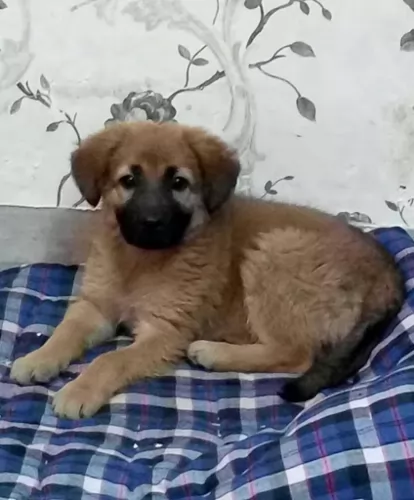 The breed is a large dog, very athletic and strong. The Himalayan Sheepdog is muscular with a deep chest, strong neck and strong shoulders. It has a medium tail that is thick and busy, curled high over its back. It is a daunting dog that can be very intimidating. They have well padded and large paws. With a broad head and wide forehead, they have a strong, wide muzzle. Their ears are high on the head and hang from the sides. They have almond shaped medium eyes that are deep set with a black nose.
The breed is a large dog, very athletic and strong. The Himalayan Sheepdog is muscular with a deep chest, strong neck and strong shoulders. It has a medium tail that is thick and busy, curled high over its back. It is a daunting dog that can be very intimidating. They have well padded and large paws. With a broad head and wide forehead, they have a strong, wide muzzle. Their ears are high on the head and hang from the sides. They have almond shaped medium eyes that are deep set with a black nose.
They are a very active and swift dogs. By their nature they are constantly in motion, patrolling their territory and guarding their flock and people. Their devotion to their people and their courage is the stuff of legends. Their coat is double with a large ruff around their necks that resembles a mane. The inner coat is dense and short while the outer coat is longer but dense as well.
 Lhasa Apsos are small dogs which stand at between 25 to 28cm in height and weigh in the region of 6 to 8kg.
Lhasa Apsos are small dogs which stand at between 25 to 28cm in height and weigh in the region of 6 to 8kg.
The body length of the dog is longer than the height of the dog. He has brown eyes, a black nose and medium length, floppy ears. The long tail is carried over the dog's back.
Many people get used to seeing a sheared or clipped Lhaso, so when they see a dog where the coat has been left uncut they can’t believe the long, straight, dense coat.
Because the dog hails from Tibet where the weather can be extremely cold, he has a double coat – an under- and outer coat. While the coat looks fairly silky, it isn’t really and is in fact quite course to the touch.
Colors of the coat can be gold, tan, cream, white, black and white. Regular brushing will be needed for the coat because this is a dog with continual shedding. These dogs are regarded as being hypoallergenic as they hardly shed.
Looks can be quite deceiving when it comes to the Lhasa Apso as he is a dog who looks as though butter wouldn’t melt in his mouth and that he is essentially just a cuddly lapdog.
This small little dog is tough, robust, strong-willed and in his heart he believes he is a huge Tiger.
He’ll make his human family a loyal and loving pet but he is wary with strangers, distrusting anyone he meets for the first time. He is a dog that will need to be trained and socialized as he may take over your home in his ‘Tiger’ role.
Smart and dominant, this training will turn him into an obedient dog to have around which is important as he can become bossy if left to go his own way.
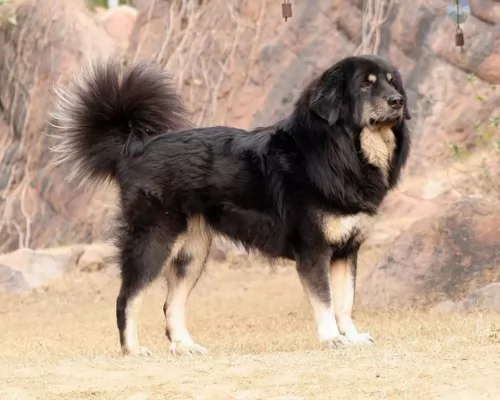 Yes with enough proper socialization
Yes with enough proper socialization
Protection and loyalty
They are not especially adaptable and need a large yard. They are not good in an apartment.
Intelligent but stubborn and independent making them able to learn if they want to.
 The Lhasa Apso is a small dog full of surprises. That's because he can be manipulative, naughty and feisty one minute, and sweet and gentle the next. He happens to be a good watch dog too, and will alert you well in advance to intruders.
The Lhasa Apso is a small dog full of surprises. That's because he can be manipulative, naughty and feisty one minute, and sweet and gentle the next. He happens to be a good watch dog too, and will alert you well in advance to intruders.
Because he is small and not a particularly energetic dog, he can slot into life in the city or the countryside with ease. However, exercise is good and necessary for every dog so be sure he joins you on your daily walks or you give him some games indoors.
The Lhasa can be a wonderful family companion and you’ll find that he can get on well with children who have been taught to treat animals with kindness and respect. He isn’t the kind of dog that you keep outdoors but is essentially an indoor dog, relishing the time he spends with his beloved human family and making a wonderful companion.
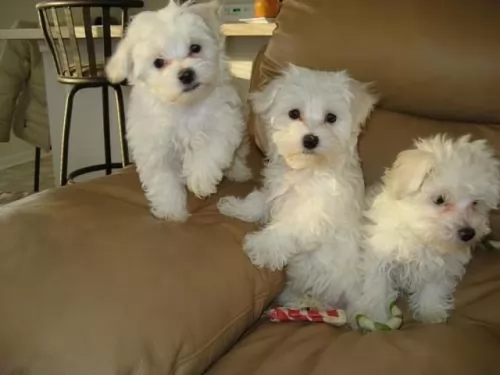 This is a pretty healthy breed with very few health issues. They have the usual large dog issues.
This is a pretty healthy breed with very few health issues. They have the usual large dog issues.
 Every dog can develop genetic health problems, but it is highly unlikely that with good care, your Lhasa Apso is going to get sick.
Every dog can develop genetic health problems, but it is highly unlikely that with good care, your Lhasa Apso is going to get sick.
He’s a healthy dog breed that can get to 14 years of age and even older. With Lhasas, health problems can include things like hip dysplasia, eye problems and intervertebral disc disease.
If you are buying a puppy, be careful from where you buy him from. You want careful breeders who screen their parent dogs for genetic diseases. Keeping your dog at the right weight and preventing obesity will also help to ensure he remains healthy.
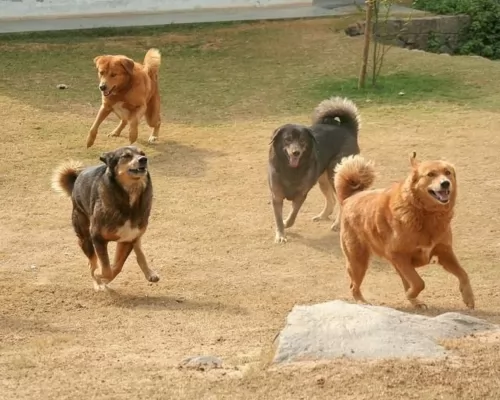 Feed the puppy 2-3 times a day with a total of two cups of a quality dog food for large breed dogs.
Feed the puppy 2-3 times a day with a total of two cups of a quality dog food for large breed dogs.
Feed the adult dog twice a day with 3 to 4 cups of a high quality dry dog food for large breed dogs.
They are very strong and athletic.
The Himalayan Sheepdog needs exercise but not to be overworked. They should be taken on long walks at least once a day. They might play fetch or run in a yard, but they don’t like too much exercise.
 The Lhasa Apso is going to require regular brushing of his coat as it can get long and then it will matt and tangle easily.
The Lhasa Apso is going to require regular brushing of his coat as it can get long and then it will matt and tangle easily.
There are owners of this dog breed who prefer to send their dog to their grooming parlor where the coat is trimmed short the way they prefer, minimizing the time spent grooming the dog. At the grooming parlour they also check the ears, the teeth of the dog and the nails, particularly if they don’t wear down naturally.
The Lhasa was bred to be a watchdog, so even though he is a small dog, he does his best to guard and protect you. He is no pushover, and training him and socializing him makes him even more adorable to be around.
As man’s best friend, he needs a high-quality, nutritious diet because this helps to protect him from disease. You can feed him the best commercially manufactured foods, but study the packaging details on what the ingredients are. You want to be avoiding corn and wheat, colorants and preservatives.
Your Lhasa has 4 – 6 puppies and as these get older and are weaned they will require 4 meals a day. Once your dog reaches one year of age, he can have 2 meals a day instead of one larger meal.
Every dog loves a little bit of home-made food as a treat, and your Lhasa will wag his tail when you add in some cooked chicken, brown rice and some raw or cooked vegetables into his kibble. Include some raw meat in the diet occasionally as well as this helps to avoid dog skin problems.
Folliculitis is a skin disease starting in the hair follicles of the dog and often occurs in conjunction with other skin disorders like mange. It is found mostly on the dog's abdomen, his armpits and groin and you’ll notice scaly rings with pus and scabs.
To avoid nasty skin diseases which can be very distressing for your pet, remember that your dog's dietary intake plays a huge role in the maintenance of a healthy skin and some raw meat is key to his wellbeing.